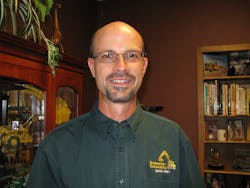Three Questions With...Keith Brubacher, President, Brubacher Excavating
Another in a series of byte-sized one-on-one visits with construction industry insiders. I talked with the very thoughtful Brubacher at the family-owned firm’s headquarters in Pennsylvania to check the pulse of a business that may be away from the headlines but firmly on the front lines.
1. How did the recession affect your company and is business back?
Business is gradually improving, but not enough that margins are increasing to any great extent. Available work seems to be matching the available capacity more closely than it has in many, many years. There are still, I think, many contractors with more capacity than what is being fully utilized. The market forces are continuing to compress construction into a commodity, and really the work that we do is in many ways for many clients becoming a commodity, and so therefore the only differentiator that I see, which plays well to our business model, is the level of stress and risk a client is going to have, and is tolerant of, in acquiring those services. So for us it’s about managing risk and reducing stress by handling ourselves professionally, and looking ahead with the client’s best interest at heart first and not our own wallet. It comes back to building trust, whether it’s the inspector, the client, the employee, or the regulatory authorities.
The recession made a major impact on us. There were some developers that were no longer solvent and a few of those impacted us, so we had two choices, change or die, and I thought change sounded less painful and less permanent. So we retooled the company, we shrank, we sold off a lot of older equipment—a lot of people sold newer equipment to get rid of more debt and gain higher value—we took an opposite approach and we sold the older, most worn out, least productive pieces that we knew would be the most costly to maintain. And we simply refrained from buying new stuff for a long time. So that was part of our strategy. We went from 375 people in 2008 down to a low of 220, and we’re back up to over 250 people. We’ve had two nice years of recovery, 2012 and 2013, this year’s still in process.
Our response also was to maintain our values and not take shortcuts just because it might have been expedient at the time when every bit of pressure was on, and we also became much more diversified. In the midst of that, we also revamped our whole project management process where we really increased the rigor of the financial reporting and the management process. And we also initiated a behavior-based safety culture program.
There’s still a fair amount of uncertainty with the economy, but I think there’s always the same amount of uncertainty; the only thing that varies is our awareness and sensitivity to it. I don’t think there’s any more or less uncertainty now than there was in 2004. We were simply less aware of the uncertainty that was creeping about. I would say my awareness about uncertainty is still fairly high, and it does impact some of the capital decisions we make, such as rental versus purchase, and other investments like that.
2. What’s your pain point?
People. It’s what gives me the greatest satisfaction and enjoyment in the business, and it’s what gives us the most challenge and stress. So it’s all in one. It’s attracting, managing, relating with, and retaining the best people. We’re in the people business, we just happen to do construction and we use a lot of really cool equipment to do it. My father taught me two important things. One is integrity. You do what you say. If you bid the job wrong and you discover it part way through, you finish it anyway and figure out how to make money doing it. The second one would be initiative. If you see something that you can do, that needs to be done, you do it without being told. There are two parts to our people: character and competence. Growing those two facets of our team is the thing that’s the greatest opportunity and the greatest threat. We don’t really sell construction services—we’re building trust and we trade on trust. There are days you realize it got off track, and my goal is to be humble enough to make the wrong road a short one, so that we can go back, redirect, and make it right. It’s not always easy, sometimes it costs a lot of money, and sometimes it costs me my pride. Sometimes all of those things.
3. Assuming it met current emissions regulations, would you buy equipment made in China?
Yes. The only question is when. There are already components made all over the world. In 1975 if somebody would have asked, ‘Would you buy a piece of equipment made in Japan or Korea?’ most contractors would have said ‘No.’ Now we’re very comfortable with both of those ideas. So I think the answer is yes on China, but when and in what circumstance—is it two years from now, or 15 years from now? That remains to be seen. Dealer support networks are very important to us, but there are established U.S.-based brands that are well prevalent throughout the industry, even in our region, that aren’t that well supported in some places where we work, or some of it ebbs and flows based on who they have representing their brand.
For more on Brubacher Excavating, look for a profile of Brubacher director of fleet Kris Hay, an Under 40 in Construction Equipment Award winner, in our September issue, or visit www.brubacher.net.
About the Author
Frank Raczon
Raczon’s writing career spans nearly 25 years, including magazine publishing and public relations work with some of the industry’s major equipment manufacturers. He has won numerous awards in his career, including nods from the Construction Writers Association, the Association of Equipment Manufacturers, and BtoB magazine. He is responsible for the magazine's Buying Files.

